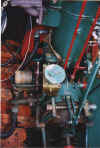|
Monterey Fishing Boats at the San
Francisco Maritime Museum |
| Model of a Monterey fishing boat with a scale Hicks engine
by Rew Melendy. On display at the San Francisco Maritime Museum. |
 |
Monterey WETTON. Build in 1923 less than a block away (from SFMM) in the
shop of one of Fisherman's Wharf's finest boatbuilders, Dominic Labruzzi,
the WETTON spent its working life trawling for shrimp in the more northern
reaches of San Francisco and San Pablo Bays. After being dragged in the
water for about an hour, the large sack-like trawling net was hauled up
and onto the starboard side of the boat, while the catch was kept in
wicker baskets on the port side deck.
Two generations of Wettons, Bud and Ed, made a
living fishing this shapely vessel, selling their catch to Chinese shrimp
exporters and fresh fish markets, and eventually at their own seafood
restaurant in San Rafael. The Wetton's original, single-cylinder,
make-and-break gasoline engine still runs, chanting its characteristic
"puck-eh-chah puck-eh-chah" sound when under way.
In order to avoid recognition by California Fish
and Game officers, the Wettons decided never to name their boat, and
referred to it simply as "the boat". To memorialize Bud and Ed,
the Park christened her the WETTON after the 1992 restoration. From
storyboard at the San Francisco Maritime Museum. |
 |
 |
 |
 |
 |
|
Power Gillnetter
"BUD". Bud is the final evolution of the earlier sailing
gillnetters used in the salmon fisheries of the Sacramento River.
Built in 1926, by Frank DiStefano in Pittsburg, California, the BUD spent
its working life fishing for salmon using gillnets on the Sacramento
River. The gillnets, much like oversized, very long tennis nets,
would be set between two boats and drift for many miles along the
river. The salmon supplied both local fresh markets and many
canneries alongshore. By the 1930's, depletion of the salmon catch
and increased water diversion from the Sacramento River led the gillnetter
fleets to pursue their catch in less protected southern waters. The
small squarish cabin on the BUD is likely a late addition, added for
protection against the winds and rough seas of the San Pablo Bay.
Eventually, commercial salmon gillnetting was outlawed, relegating boats
like the BUD to sport fishing and recreational boating. The original
Hicks gasoline engine still powers the BUD today. From
storyboard at the San Francisco Maritime Museum. |
 |
 |